Treasure in Trash
The countries with the highest estimated gold from recycled e-waste
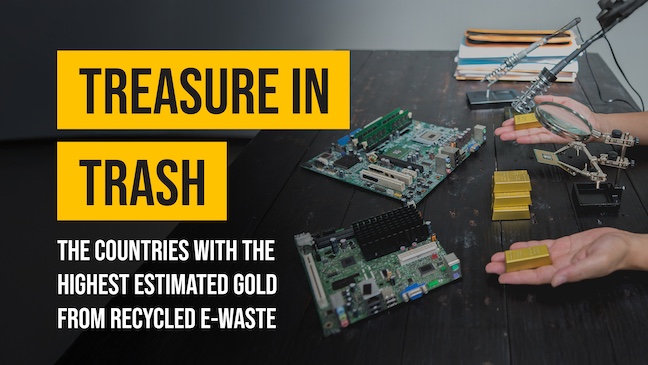
The vast majority of people think of gold as sourced through mining or when people buy gold bars. However, the Royal Mint has begun processing electronic waste in order to extract gold from it1.
We, as a planet, produce a lot of electronic waste, with 62 million tonnes produced in 2022. This is on track to rise to 82 million tonnes produced annually by 20302. But if much of this can be recycled into gold, which countries produce the most e-waste and have the highest estimated gold worth from this?
The experts at The Gold Bullion Company have delved deep into a range of data to answer that question. We looked at the total kilograms of documented recycled e-waste each country produced. We then used the figure for the amount of gold produced globally from recycled e-waste to calculate the estimated gold produced from each country's documented e-waste. Finally, we took live gold prices to calculate the estimated worth of the gold produced from e-waste.
The United States has the highest estimated gold worth from recycled e-waste
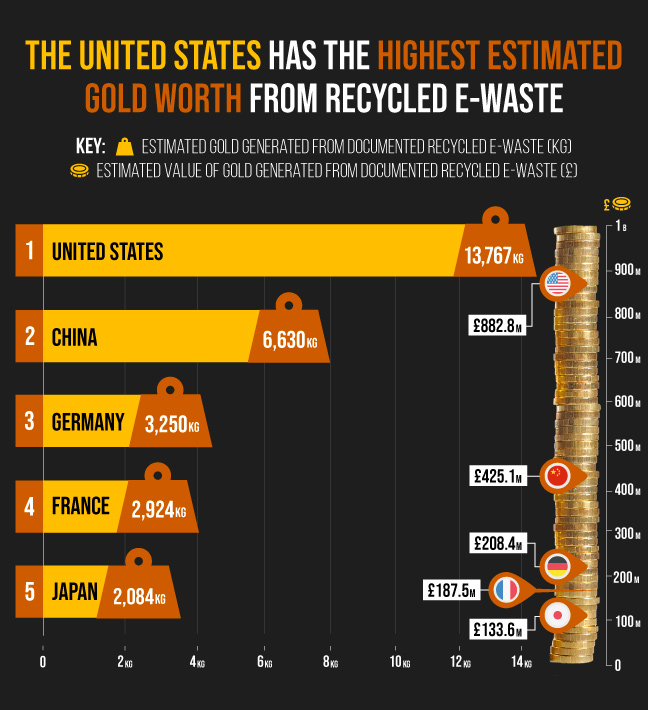
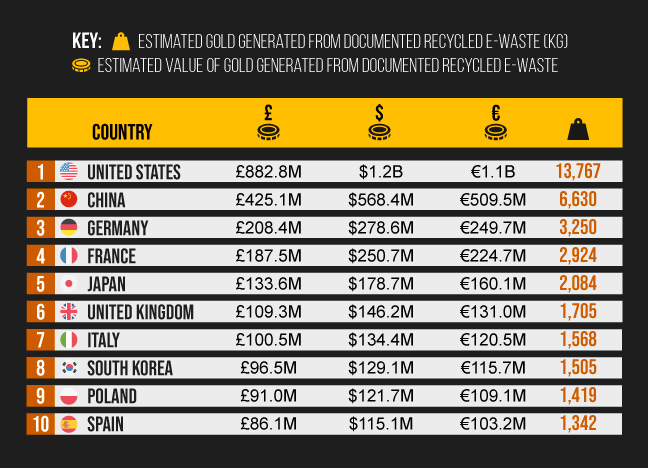
1. United States
Estimated value of gold generated from e-waste: £882.8M | $1.2B | €1.1B
The United States is the country with the highest estimated value of gold from documented recycled e-waste. During 2022, the US produced a whopping 4.1 billion kilograms of documented recycled e-waste, double that of the next highest country, China. The estimated gold generated from that much e-waste is around 13,767 kilograms, which is worth around £882.8 million.
The United States' consumerist culture could be a major contributing factor to its high e-waste production. It is common to buy the newest gadget model and then throw out the old one.
2. China
Estimated value of gold generated from e-waste: £425.1M | $568.4M | €509.5M
China takes second place, with its estimated gold worth from recycled e-waste being about half of the United States' total. This is likely due to China being treated as a global e-waste hub, with Western countries exporting their own e-waste to China since the early 1970s to be recycled there instead, as China has a larger workforce and cheaper labour.
China had 1.9 billion kilograms of e-waste that was formally documented and recycled in 2022. From that much recycled e-waste, it produced an estimated 6,630 kilograms of gold, which is worth around £425.1 million.
3. Germany
Estimated value of gold generated from e-waste: £208.4M | $278.6M | €249.7M
Germany rounds out the top three countries with the highest estimated gold value from recycled e-waste. The country documented and recycled around 956.6 million kilograms of electronic goods waste. As a member of the European Union, Germany has to abide by strict waste management policies. Under the Waste Electrical and Electronic Equipment Directive, member states are required to responsibly collect, treat, and recycle e-waste.
Germany’s 956.6 kilograms of recycled e-waste could generate an estimated 3,249.53 kilograms of gold, which would be worth approximately £208.4 million.
Azerbaijan is the country sitting on the least estimated gold from recycled e-waste
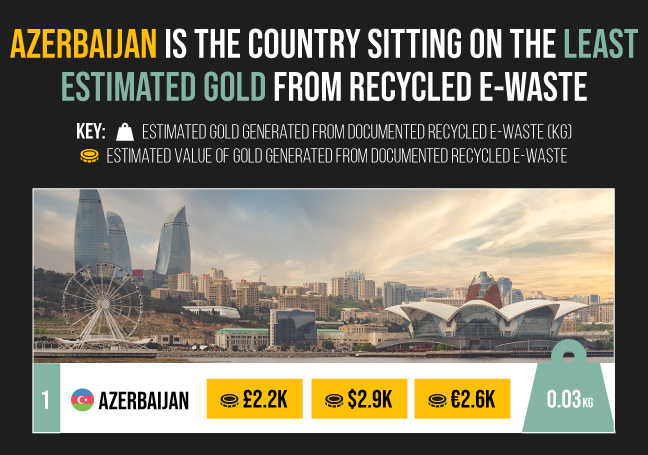
1. Azerbaijan
Estimated value of gold generated from e-waste: £2.2K | $2.9K | €2.6K
Azerbaijan has the smallest amount of documented and recycled e-waste in the world, with just 10,000 kilograms in 2022. This could be for a range of reasons, such as a limited e-waste management infrastructure or the lack of regulations to specifically target the issue, as the EU does.
The amount of documented and recycled e-waste in the country could generate an estimated 30 grams of gold, which in turn, would be worth around £2,200.
2. Namibia
Estimated value of gold generated from e-waste: £6.5K | $8.7K | €7.8K
Namibia shares second place with two other countries, having documented and recycled around 30,000 kilograms of electronic waste. Namibia, for a long time, didn’t have many electronic waste policies. However, the government is working on integrating something similar to the EU’s policies3.
The amount of recycled electronics in Namibia could hypothetically generate around 100 grams of gold, which would be worth around £6,500.
3. Saint Lucia
Estimated value of gold generated from e-waste: £6.5K | $8.7K | €7.8K
Saint Lucia also recorded and recycled 30,000 kilograms of electronic waste in 2022. When calculated per capita, that’s just 170 grams, so perhaps the Caribbean Island nation's small population could be a contributing factor.
The island's 30,000 kilograms of e-waste could generate an estimated 100 grams of gold, worth £6,500.
4. Zimbabwe
Estimated value of gold generated from e-waste: £6.5K | $8.7K | €7.8K
Zimbabwe also shares the same e-waste recycling figures as Namibia and Saint Lucia. This is likely due to an underdeveloped e-waste collection and recycling infrastructure. This could include too few or hard-to-access collection points, making it difficult for people to properly dispose of their e-waste.
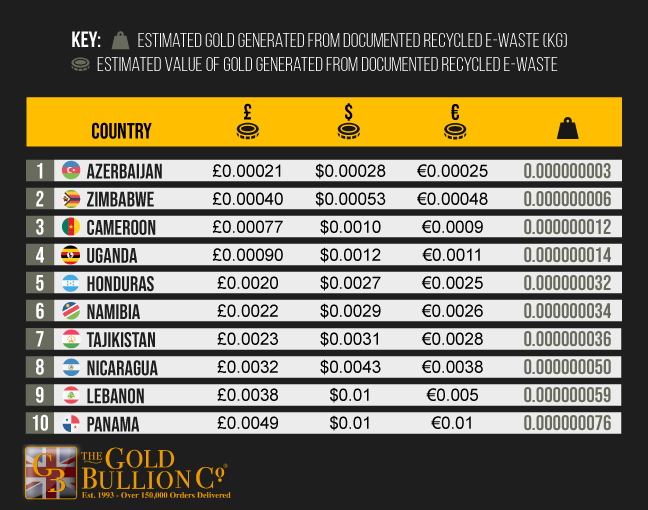
Norway has the highest estimated gold value from recycled e-waste per capita
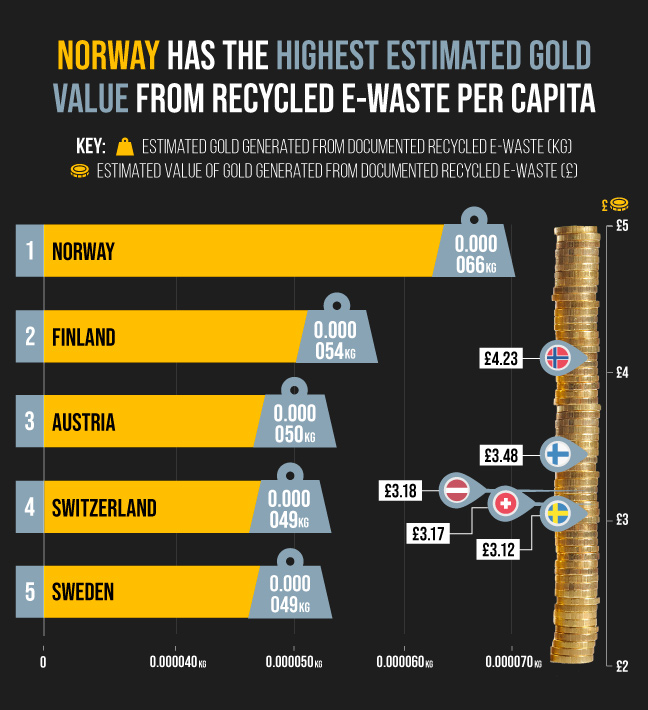
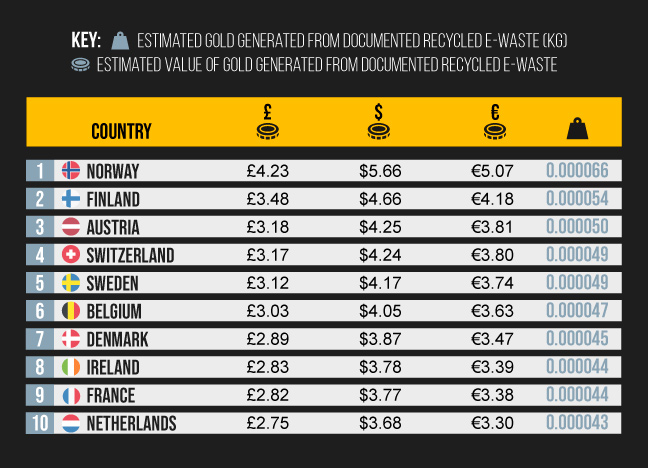
1. Norway
Estimated value of gold generated from e-waste per capita: £4.23 | $5.66 | €5.07
Norway has the highest amount of gold worth generated from documented and recycled e-waste in the world. Norway produced 19.42 kilograms of documented and recycled waste from electronic goods in 2022 per capita, which could generate an estimated 0.066 grams of gold worth £4.23.
Norway also has a system called Extended Producer Responsibility, which requires electronic goods manufacturers to take responsibility for their products' entire lifecycle, including recycling.
2. Finland
Estimated value of gold generated from e-waste per capita: £3.48 | $4.66 | €4.18
Having documented and recycled 16 kilograms of e-waste per capita in 2022, Finland could have generated an estimated 0.054 grams of gold per capita worth £3.48. Like Norway and many other countries, Finland has a strenuous Extended Producer Responsibility system. However, Finland is also a member of the EU and, as such, has to abide by further rules and regulations implemented by them.
3. Austria
Estimated value of gold generated from e-waste per capita: £3.18 | $4.25 | €3.81
Austria rounds out the top three countries with the most gold worth from e-waste per capita. In 2022, Austria documented and recycled 14.59 kilograms of waste from electronic goods per capita. This could generate an estimated 0.049 grams of gold, which is worth £3.18. The country has implemented the Austrian Waste Management Act since 2002. This act outlines the country's strict policies on waste management, with the primary goal of protecting the country's environmental health and natural resources4.
Azerbaijan has the lowest estimated gold worth from recycled e-waste per capita
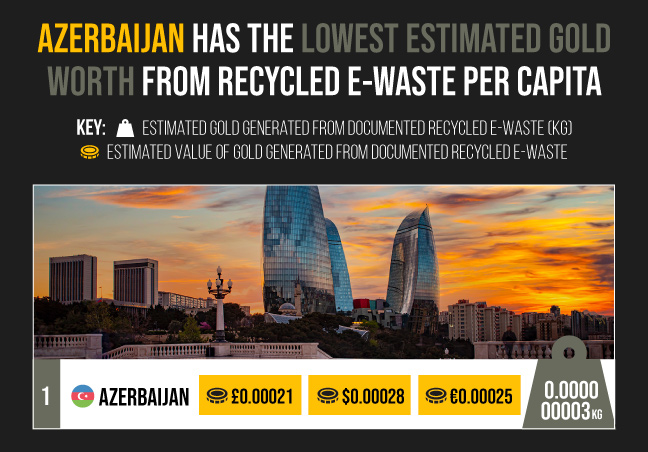
1. Azerbaijan
Estimated value of gold generated from e-waste per capita: £0.00021 | $0.00028 | €0.00025
Azerbaijan, having been the country with the least amount of recycled e-waste as a country, also has the least when calculated as per capita. During 2022, the country documented and recycled just one gram of electronic waste per capita. This could produce an estimated three micrograms of gold, worth just 0.02 pence.
2. Zimbabwe
Estimated value of gold generated from e-waste per capita: £0.00040 | $0.00053 | €0.00048
Zimbabwe, which ranked joint second for the lowest estimated gold worth produced from e-waste, also ranks second for the lowest gold worth from e-waste per capita. The country recycled just two grams of electronic waste per person, producing six micrograms worth just 0.04 pence.
3. Cameroon
Estimated value of gold generated from e-waste per capita: £0.00077 | $0.0010 | €0.0009
Cameroon is third among countries with the lowest estimated gold worth from recycled e-waste per capita. In 2022, the country recycled just four grams of electronic waste per capita, which could produce just 12 micrograms of gold per capita, which is worth 0.07 pence.
.jpg)
Methodology -
To begin with, we used the United Nations Institute for Training and Research “The Global E-waste Monitor 2024” to record the “E-waste Documented as Formally Collected and Recycled (million KG)” for each country the data was available for, from table “A2.4 Key e-waste statistics, by country or territory (2022)” on pages 120-135 of the document. We also used page 136 to record the figure for 2022 global gold recovery (47, in thousands kg) from table “A2.5 Overview of e-waste flows for 2030 scenarios and viable recovery of metals”.
We were then able to calculate the total figure for “Global e-waste documented as formally collected and recycled (kg)” for each available country. We then divided this figure by 47,000 to get the average gold generated globally by kg of waste recycled (0.0000034). We then multiplied the amount of “E-waste documented as formally collected and recycled (kg)” by that figure to estimate the amount of gold generated from documented and recycled e-waste (kg).
We then used The Gold Bullion Company’s Live Gold Price per Kilogram to take the live prices of gold per kilogram in GBP, USD and EUR. The prices were taken and are accurate as of 26/09/2024, 14:30 BST. We then multiplied the “Estimated gold generated from documented recycled e-waste (kg)” for each country by the prices of gold per kilogram in each of the three currencies.
Finally, we used World Population Review to get the most recent population estimates for each country. We then used this to calculate the Estimated gold generated from documented recycled e-waste (kg) and its estimated worth per capita.
References -
1. https://www.bbc.co.uk/news/articles/c6p2k11e41po
2. https://unitar.org/about/news-stories/press/global-e-waste-monitor-2024-electronic-waste-rising-five-times-faster-documented-e-waste-recycling
3. https://www.scycle.info/wp-content/uploads/2024/04/D-GEN-E_WASTE.05-2024-Namibia.pdf
4. https://www.oesterreich.gv.at/en/themen/bauen_und_wohnen/abfall/
Seite.3790051.html#:~:text=The%20Austrian%20Abfallwirtschaftsgesetz%20










.jpg)














